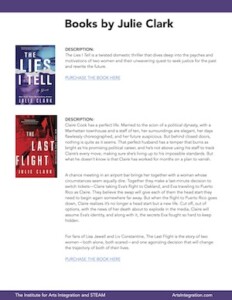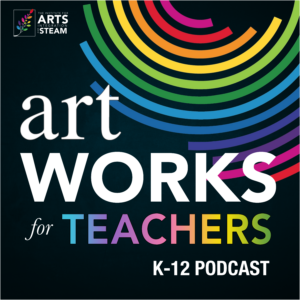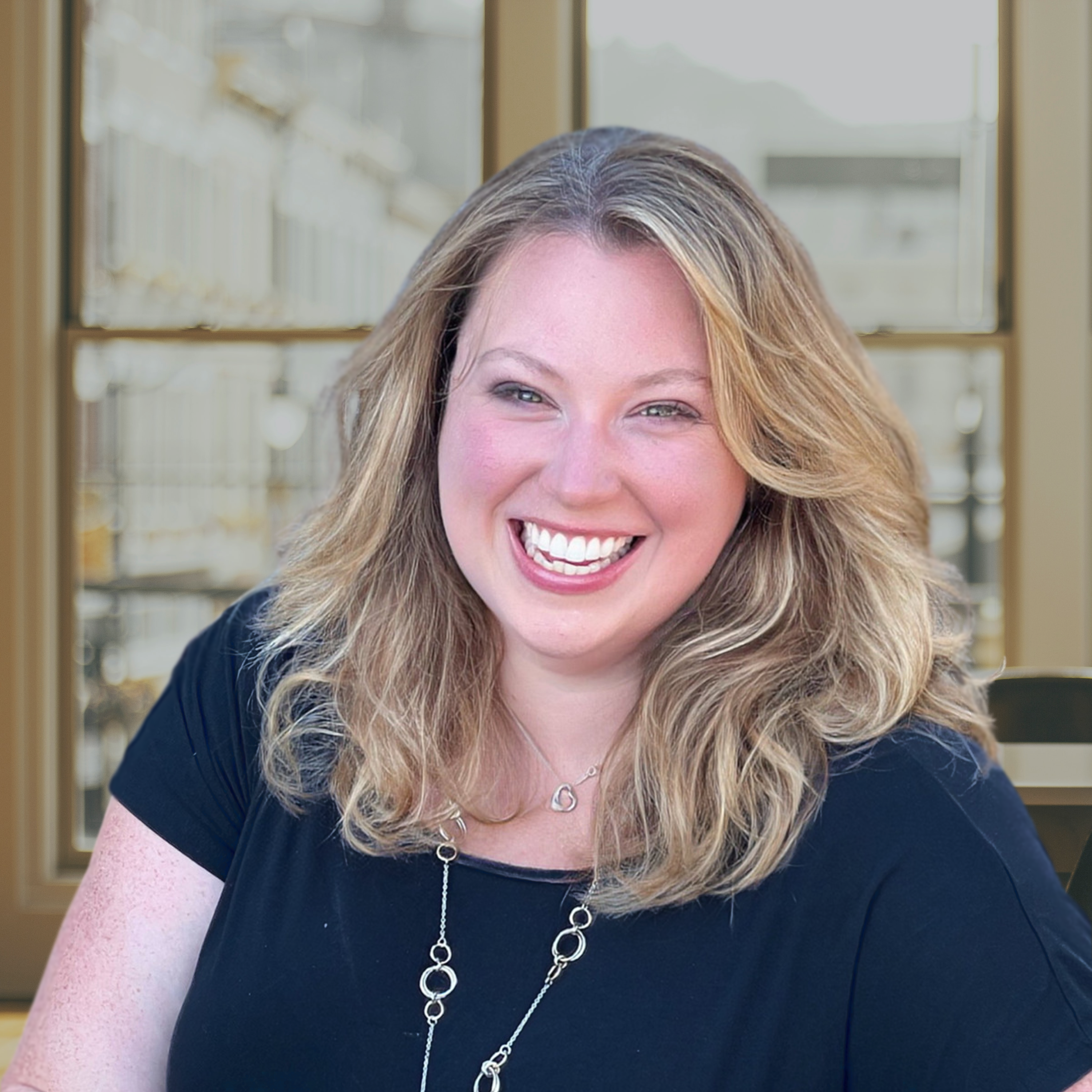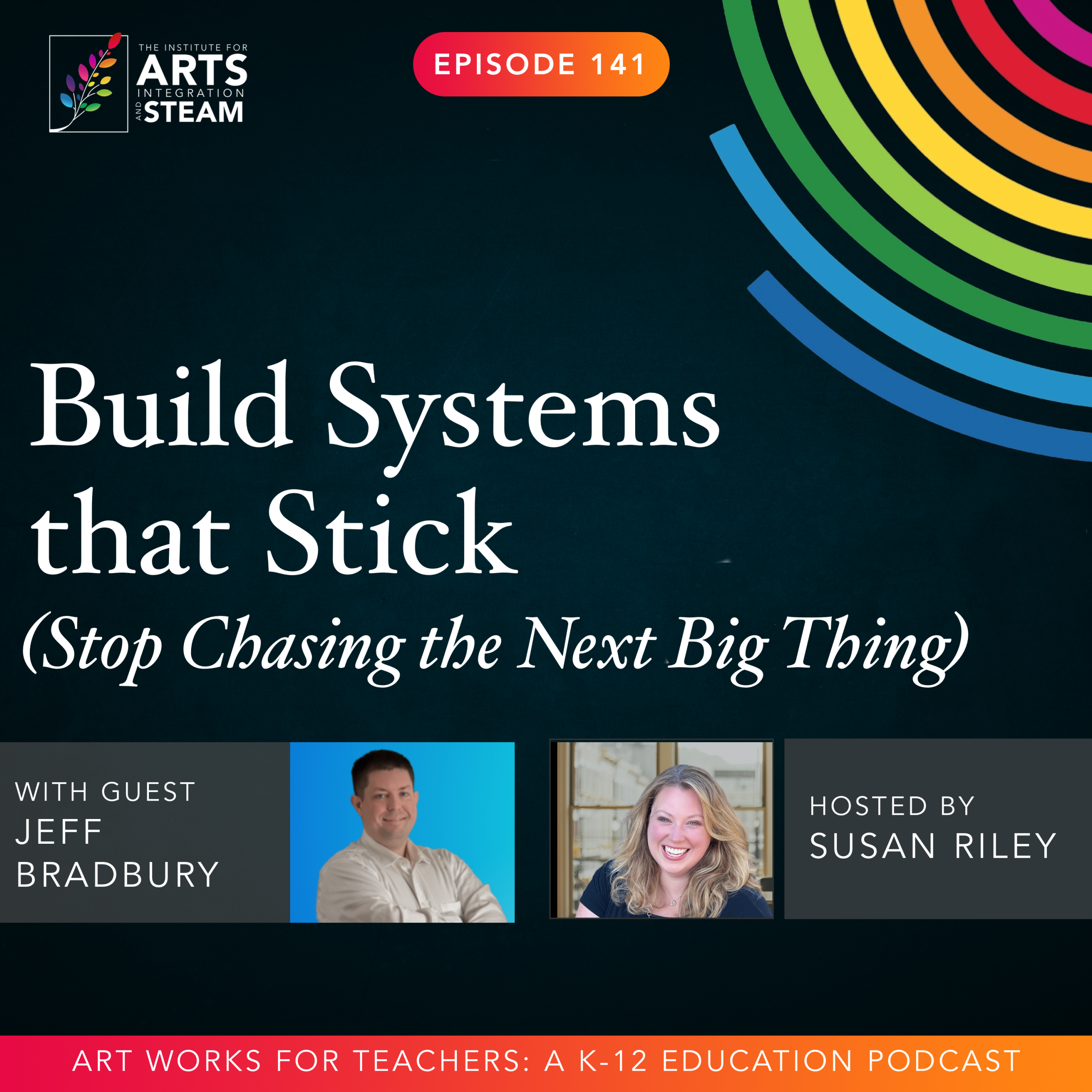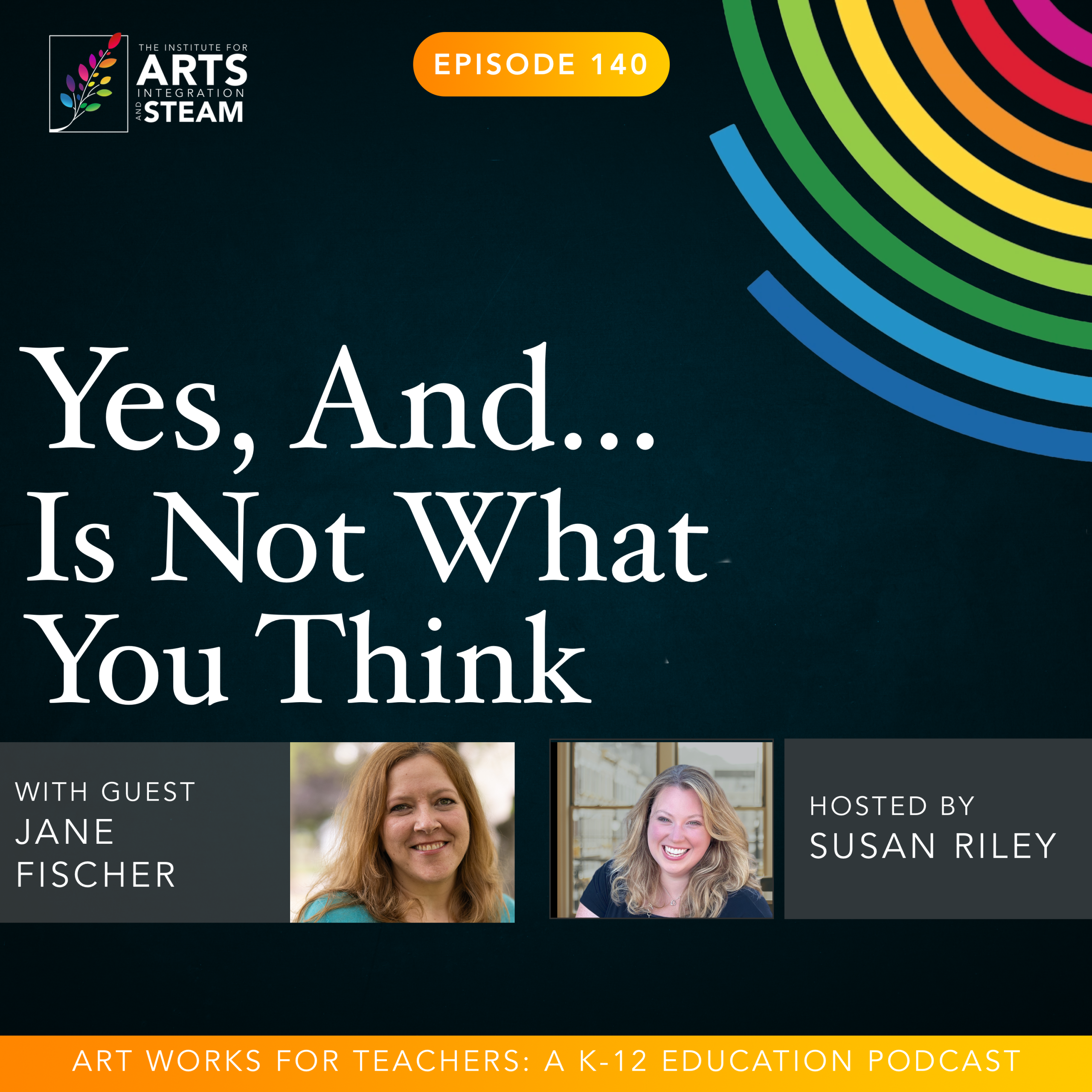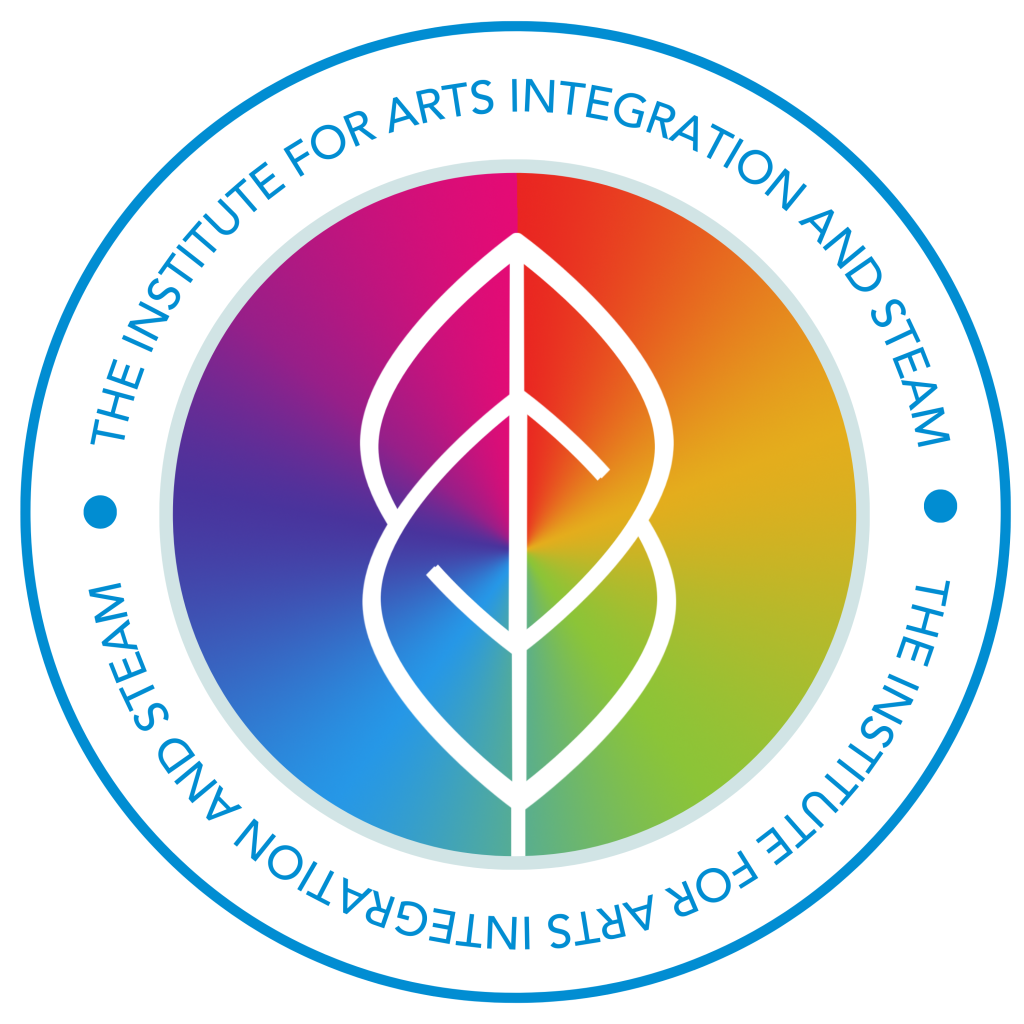ART WORKS FOR TEACHERS PODCAST | EPISODE 024 | 31:55 MIN
Teaching While Writing
Julie Clark, NYT Bestselling Author of The Last Flight and The Lies I Tell, is more than a writer. She’s also a 5th grade teacher. Tune in as Julie chats about what it’s like to live in two worlds and to cultivate her passion for both.
Enjoy this free download of books by Julie Clark.
Ep 24 Julie Clark: Teaching While Writing
Susan Riley: Welcome, Julie Clark. I’m so glad to have you on the show today.
Julie Clark: Thank you. I’m happy to be here.
Susan Riley: Awesome. So for those people who may not know you and your work, can you introduce yourself for us and just let us know a little bit about, you know, what you do.
Julie Clark: My name is Julie Clark. I am the author of three books so far.
The first book I published was in 2018, called The Ones We Choose. Mm-hmm. Then I published The Last Flight in 2020, and this year I just released my latest book, the Lies I Tell.
Susan Riley: Which is amazing so far. I have a copy right here and I’m like so into it. I can barely put it down. It’s very similar for me in the way that I read it, to the way that I read The Last Flight. Which as soon as I finished The Last Flight, like my daughter picked it up because she was like, yeah, you were so into it. I wanna see what this is like. Very much different, different plot line, but, much the same kind of reading frenzy that I’ve been doing with The Lies I Tell. So I’m excited to kind of dig in.
I’ve also heard that you’re an educator too, right?
Julie Clark: I am, yes. I teach fifth grade, so this is why I get up so early in the morning. I write in the morning before school, because if you’re a teacher, you know that by three o’clock in the afternoon you’re pretty much fried. You’re not good for much else other than maybe reading for pleasure. For watching, you know, reality TV basically.
Susan Riley: Right. So I’m gonna start there because I’m, I’m really curious now for those people who are not watching the video format of this. It’s early, like it’s 8:00 AM here on the east coast. For you, it’s 5:00 AM over there and she’s like, you know, bright and perky over here at 5:00 AM, friends, before she sent it into work.
So talk to me about what it’s like to, to be both a fifth grade teacher and a writer and to try to balance both of those.
Julie Clark: I have to be really protective of my time. And so, I generally don’t allow my school life to infringe on my home life, which is, as an educator, that’s really hard to do, you know, because you’re thinking about your students all the time.
A lot of my colleagues have their work, email, go to their phone and I refuse to do that because I know that if I did, I would be responding to emails and thinking about kids and problems. And… but I wake up very early in the morning. I wake up around 3:30 every morning and write until about six.
And then and then I’m done for the day. And it’s sort of like how some people like to exercise before work, right? Yeah. And then they feel really good about, you know, got my workout done. I don’t have to think about it the rest of the day. It’s kind of like that, where I get my writing work done and then it’s done for the day, and then I can go to school and really focus on my students while I’m there and not be thinking about writing or publishing or how the book is doing, or whether I’m gonna be able to take this trip or that trip.
Like I can just really focus on my students. So I actually really like the very different ways that my brain is asked to work every day. Yeah. And it’s kind of, you know, it’s one of those things where when I’m writing it’s wonderful because my characters do exactly what I want them to do all the time.
Yeah, and if you’re a customer, like that doesn’t happen during your work day, . No, but the flip side is that, you know, when I go to school and I am sitting, working with students helping them with whatever it is they need, they need help with, like, it really does crowd out a lot of angst and anxiety that publishing can often bring, you know, will I get this, will I get that?
Will people like the book? Like, you know, the students don’t care about any of that and it’s wonderful to just be around kids, you know? They help you forget, I mean, kids in teaching really is like the best job for, for getting any of your problems because, you know, they don’t care, right. And you don’t have time to care either, because if you care, if you let yourself care for 10 minutes, like the whole, the whole show falls apart.
Susan Riley: So. Yep. Yeah. My grandfather always used to tell me, you know if we all took our problems and put them in a pile, you wanna keep yours
Julie Clark: Yes.
Susan Riley: And not take anybody else’s. And I think that’s true. Like when you’re, when you’re working with kids, you know, everything else that you’re working on. It doesn’t matter because what matters that really fades away.
Julie Clark: Yeah. And so it’s nice. It’s a really nice thing. So it doesn’t allow for much of a social life. You know, there are times where you know, there are things that you know, I have to do. I’m also a mom and so, you know, last night I had to take my son to a high school thing. Yep. And you know, I’m looking at my watch and I’m like, okay, I gotta figure out how late we could stay here and still be able to wake up tomorrow morning and get my work done. You know?
Susan Riley: Yeah, for sure, a challenge. There’s a balance there, but you know, as to your point, you’re making time for what’s important to you, and that’s, that’s critical. So I’m curious because the books that you write are not for youth necessarily, right? So so how does how do your, first of all, do your kids know? Do your students know that you write?
Julie Clark: Yeah, they do. I don’t really think, I think their parents care more than they do . Every now and then a kid will say like, “oh, my mom loves your books.” Or, you know or “my mom thinks it’s cool that you write”, but they don’t care.
Susan Riley: But well, but also I think it’s, it’s also helpful for students to see different careers and at the same time, oftentimes, they don’t know what they could do unless they see somebody else that they know doing it. You know what I mean?
Julie Clark: Yeah, I try not to talk about my writing career too. I talk about being a writer all the time. Yeah. Because I teach writing, so I talk a lot about struggles that I have and ways that I work and things like that. But I don’t know if they put the two together. I, I think they’re just like, oh, she’s just talking.
You know, she all teachers say that. Right. And, I don’t think that they necessarily connect it to, you know, having a successful publishing career. Right. And so I, yeah, I, I, I feel very strongly that, you know, I wanna make sure that my students and my families know that when I’m at school I am 100% their teacher, not, not just doing it on the side. You know?
Susan Riley: Right. That you’re fully dedicated to them. Yeah, sure. Yeah. So that being said, how does the process that you use as a writer impact how you teach your students, how you teach writing to your students? Other than bringing in real world examples of, you know, I’ve struggled with this, or I’ve struggled with that. Does the writing process itself, the way that you approach writing as an author, impact in any way how you teach writing to students?
Julie Clark: It really doesn’t. Because they are all emerging writers. Mm-hmm. Really just learning how to put ideas together and support them. They don’t do a ton of fiction writing, which is what I do. So, you know, I’m teaching literary essay, I’m teaching persuasive writing, I’m teaching, you know, and there are things that I can weave in every now and then. Mostly about revision that I talk mostly about. Mm-hmm. And how writers revise their work and what that looks like and how that feels.
But like it’s, they really don’t overlap that much.
Susan Riley: Interesting, yeah. I would think in my mind that the way that you write or the way that you approach writing may influence how you’re working with students, but you’re right. If they’re working on something a, a totally different writing style, and as emerging writers, it would, it, it makes sense that it doesn’t necessarily cross over.
Julie Clark: That much. Every now and then I’ll get someone who really is jazzed about writing and they wanna write fiction and they want me to read their stories and things like that. But that’s pretty, that’s pretty rare. Yeah, I mean, well, I mean, rare in the sense that like that you know, what they’re producing is something that is, you know, quite good.
Susan Riley: Yeah. Well, yeah. At fifth grade. Yeah , you’re right because they are emerging. Yeah, of course.
Julie Clark: They really are, and finding their voices and figuring out what works on the page. And, you know, a more, more of my like kind of writer’s lens comes in when I’m teaching reading actually.Because we study fiction mostly.
We do some non-fiction work too, but fiction is really a huge part of our daily life. Sure. And so we do talk a lot about moves the author makes, and ways the author delivers information without saying it explicitly. So a lot of where I get a I can talk a little bit more about fiction writing for kids is, is when we’re doing reading.
Susan Riley: That’s great. That’s great. So have you, did you always wanna do fiction?
Julie Clark: Yeah. Oh yeah. No, I mean there was never a time when I wanted to write like non-fiction, no .
Susan Riley: I kind of feel like writers are in, in one of two camps. It’s like people who are either really good at geometry, are really good at algebra, but you’re not good at the other one.
Yeah. Like I feel like writers really
Julie Clark: know algebra. Yeah. I was not geometry.
Susan Riley: Yeah. See, and I was not algebra, so there you go. Yeah. And I feel like writers are often very similar in that you’re either, you know, your, you’re camp fiction or you’re camp non-fiction, you know informational writing. So so in terms of writing fiction, can you talk to us a little bit about your, your writing process? I’m, I’m always curious, how do you go about writing? What does that look like for you and how do you work best?
Julie Clark: Every book is different, first of all. So I have learned, I’ve only written three books, but I have learned that the way I wrote my first book is not at all the way I wrote my second book, which is not at all the way I wrote my third book, which is not at all the way I’m writing my next one.
So if you think that, you know, once you figure out how to do it, then you could just do it again and again and again. Like that’s a myth. That doesn’t work. It does. Every book is different. Okay. But generally I start with an idea, sort of a, sort of a glimmer of an idea, and then I build a world, world around it.
So I might start with a situation, like with the last flight I started with, you know, what if a woman wanted to disappear without a trace? Like could she do that in this sort of tech-saturated world and not leave a footprint somehow? In some way? Yeah. And then I built a world around that in which a person actually did that.
You know, who, who would she be? What would she be running from? How would she do it? What would be the circumstances under which she would need to act? Yeah. And what would be her roadblocks? What would her world look like? And so you start with that little seed of an idea and you sort of build the world around that.
And kind of the same thing with Eva, you know, a female con artist and why would she be doing that and, and what would cause her to grow up to become one? And you know, what, what are her cons? What is she trying to accomplish? What is her big need or want? So that’s sort of how I get my ideas and they’d sort of come to me generally.
They come to me about midway through whatever book I’m working on. So, you know, it’s sort of like a glimmer of like a new boyfriend, right? Yeah. Where you’re like, oh, that’s cute. But I’m in this relationship right now. But I’m kind of interested in that. And so I’m gonna kind of watch from afar and think about it a lot in my quiet time.
And then when I break up with this book, I’m ready to jump into a new relationship with that book. But I don’t have like a list of ideas or, you know, I’m not flipping through my book looking for ideas. Like I just, I just have to trust that they’ll show up and so far they have just shown up. So, yeah. You know, that’s how I get my ideas and I do a lot of long handwriting.
That to me, because I wake up early and so a lot of times I’m just writing in bed. Most of the time I’m writing in bed. Yeah. And , and I feel like longhand sort of helps me develop the world in a way that doesn’t feel like I need to be producing words, right? Mm-hmm, like there’s no word count in my notebook.
It’s just ideas, right? And then, and then I start to draft, and that’s not fun. I don’t enjoy that. I don’t enjoy that part. .
Susan Riley: And so do you do a lot of research around, like, because I was thinking as I was reading The Last Flight, how much like detail that you were putting into each of these characters, how much you had to have known, particularly about where they were and kind of their backgrounds.
Do you do a lot of like sketched out research ahead of time or just is that evolving as you are?
Julie Clark: It evolves a lot as I am revising because, you know, a first draft of my book is just pretty bare. A, a finished novel is anywhere for me from about. 80 to 90,000 words. And so a first draft is really only about 50 to 60 words, and that’s just really just straight up plot.
Who are these people? What do they want? Where are they going? A, B, C, what do I want them to end up? And then, and then the revision and rewriting part is really about fleshing out who they are and what do they want. And that often changes as you try things and you’re like, well that doesn’t work. I don’t care about that.
Or you know, that she wouldn’t do that. She wouldn’t say that. And the more time you spend with them on the page, the better you get to know them, the more real they become. And you start seeing glimmers of like who they need to be in order to deliver whatever message it is you want them to deliver.
Mm-hmm.
Susan Riley: So do you have like a team of people who will read through. I’m assuming your first draft and every revision, so that, and they give you ideas, or is that more of a refining process once you turn it over?
Julie Clark: I have a couple very close writer friends who generally read early drafts. Mm-hmm. Because a lot of times what happens is you get a rough draft and you’re like, I don’t know what I want this to be.
Mm-hmm. And you know, you have to find people who are willing to look at that and be like, here’s what I think you’re trying to say. You know? Yeah. And, and, and it’s a hard, it’s a hard thing to find people who do that for you. Because it takes a lot of time and it’s a reciprocal thing. So I do it for them.
They do it for me. I don’t have a ton. I, I, I do have a lot of writer friends who I’ll say like, “Hey, you know, would you read this?” But generally, by the time I’m ready to send it to one of them. Mm-hmm. Hm, it’s pretty because I don’t wanna waste their time. Right, right. It’s pretty done. You know, I’m looking for like plot holes.
I’m looking for, you know, believability issues, connections that don’t quite match, not necessarily like who are these people in, what do they want? Right. That’s a pretty small circle that I, that I keep with that. .
Susan Riley: Yeah. And I know some authors that I’ve interviewed have, they keep it very close to the best until they’re, like, really ready to release it.
And some people just send it out right away and are like, gimme feedback and, and let’s work on this a little bit more collaboratively. So I’ve always like to, I’m always interested to hear everybody’s process and how they prefer to go through it. Particularly if it’s different for every book. What structures still stay the same?
Julie Clark: Yeah. And that’s, it’s hard too, you know, people are busy and, you know, you have to find time to, you know, I, I work with an outside editor. I, I have a very reliable editor that I, that I’ve worked with on three books now. Where she’s really the first one that I, that I send it to. Sure. Because, you know, she’s, she’s really, really good at what she does.
Susan Riley: Awesome. Yeah. And that’s, that’s key. I have found that in my business as well, that when you have people that you can trust, yeah. It takes such a load off.
Julie Clark: It saves a lot of time, you know? Yeah. And I, my goal is to produce, you know, to publish a book every two years. And it takes, it takes about a year.
Once my editor, editor at my publisher gets her hands on it, it takes about a year, so I need to have it almost done. Yeah, by the time I get it to her. So it takes about two years from start to finish. So, you know, I don’t have a lot of time to sit and play with it. Yeah. In the same way that, I mean, I could take longer than two years to publish a book, but I feel like readers forget about you if you take any longer than two years. So…
Susan Riley: I was just gonna ask, in that process, do you give yourself any kind of downtime in between those books or does it, it just kind of keeps going.
Julie Clark: No. Writing is a muscle and so I find that when I, and I do take time off, but I find that when I take too long off, I sort of lose the momentum.
It’s not necessarily a muscle, but it’s a momentum. It’s a desire to get up and keep pushing and pushing and pushing. Yeah. And when you’re in the middle of it and you, and you’re on, on the trail of something, It’s really easy to do and then if you take enough time off, then you’re sort of like, ah, I dunno.
Yeah. You know? Yeah.
Susan Riley: Yeah.
Julie Clark: It’s like waking up in the morning better to just kinda, it’s the same thing with waking up every morning. Yeah.
Susan Riley: At 3:30, right?
Julie Clark: Like, yep. I could, you know, go on vacations and stuff, I could just let myself sleep in, but that first day back at work is brutal. Yeah, yeah, exactly. Well just keep doing it.
Susan Riley: Exactly. Yeah. So now you talked about how each of your, your three books were. But I know that The Last Flight and the, The Lies I Tell both of those were New York Times bestsellers, which is an incredible feat I have from what everything that I’ve ever read about book publishing. Getting on that list is a phenomenal feat, so congratulations.
Julie Clark: Thank you for that.
Susan: How, how was that process? How did, first of all, how did that process unfold for you? Like what were the steps that you felt like you needed to take in order to get there, and how was that different from your first book?
Julie Clark: Well, my first book is a different genre. It was up market, women’s fiction.
And so I think it’s a completely different beast. You can’t, you can’t compare them. Thrillers are highly commercial hugely popular. They just sell differently, so, and I didn’t set out to write a thriller in order to make the New York Times list. I had an idea. Two women who wanted to, you know, kind of trade places and escape from their lives.
And in my mind, it was a, it was another upmarket women’s fiction, but my agent said, this is a thriller. And I thought, it is. And then I had to figure out how to write a thriller which was not easy, you know? Yeah. And so, I had to do, you know, I had a very close friend who is a very, you know, successful thriller writer and, you know, she helped me a lot and read a lot of thrillers and and so, you know, you have to kind of adjust to what it is you’re, what it is you’re writing.
But really, I mean, there are. Hundreds and hundreds and hundreds and hundreds of books that are published every month that are New York Times List quality. Yeah, really. They’re, they’re very good and don’t hit the list. And so to be on the New York Times bestseller list is not necessarily because you are, you are the best books.
Mm-hmm. out there, you’re the books that have sold the best. Right. That’s, that’s the measure. How many copies have you sold? And, and with New York Times, it’s a, it’s a, it’s a fuzzy math that they do, you know, certain, certain sales count more than others. And they’re very, they’re very they’re very tightlipped about how, how that math works.
Mm-hmm. And. . It really, it really comes down to publisher support for whether your book hits that list or not. You know, it’s, it’s whether you know enough people know about it. Have they heard about it? What was the marketing for the book? What was the promotion for the book? How many, you know, what, what was the print run?
If the print run was low? Like, you’re not gonna sell enough books to hit the list. Oh, you have to have a decent print run. You have to have you really, it really is a partnership success story for. For the books on that list where the publisher is driving the car, basically. Mm-hmm. . And if you’re lucky enough to be in that car, then you have a chance at it.
It’s not guarantee, you know? Yeah. People still have to, people still have to connect with the idea. They have to wanna pick up the book. They have to wanna pay 30 something dollars for a hard cover. and, and in this economy that’s, that’s challenging. You know, the list right now is, is incredibly hard to break onto.
Even from June when the Liesel was on, it’s, it’s different and it’s, and it’s incredibly, incredibly challenging. So it starts with a great book. It starts with a great idea. Yeah. And starts with a good book and then, but there’s so much more that has to happen. You know, that’s, that’s completely out of the author’s hands.
Susan Riley: Sure. Do you ever feel kind of pressure as you’re writing now that you’ve been on it twice, do you feel like pressure on this next book to, to, to do that again? Or is that not even under your mind?
Julie Clark: Oh, it’s always on your mind. I mean, that would be, I would be lying if I said, it’s not on, on your mind, you know?
Yeah. It’s, it’s something that you. All authors want. Sure. I can’t think of an author that’s like, eh, I don’t care. You know, like, yeah, you want that because it’s visibility and that means that you sell more books. You know, that’s the goal. That’s the name of the game. You want your book to be in as many hands as possible.
Yeah. And the New York Times is a really great way to get there. Yeah. You know, it’s not the only way, but it’s the best way. Yeah. And so I wouldn’t say that anybody doesn’t care about it, but you can’t. The thing that that helps is to remember that like, there are a lot of people that hit the list and then don’t hit the list, and then hit the list, and then don’t hit the list.
And like, it’s not a, it’s not a straight ladder up. It’s not like corporate America where first you’re, you know, first you’re a paralegal and then you’re, you know, and then you’re an attorney, and then you’re an associate and then you’re a partner. Like, it’s, it’s, it’s a, it’s an up and down thing. And so you kind of have to set that aside and.
And not worry about it in the sense that like when you’re drafting a book, you can’t predict what the market is gonna be in a year or two. Yeah. When the book hits. Yeah. Sometimes, you know, there are things happening in the world that dovetail really nicely with a book’s release that’s just. Circumstance, right?
Susan Riley: Sure, so I’m, I’m gonna get to a closure here in just a second because I was thinking about this briefly as I know several teachers who love to write and who have thought about becoming an author. And I know a lot of them have actually said to me, I don’t know whether it would be better to just self-publish or to get a publisher? Have, do you have like advice for people who, for, especially for educators who are looking for another creative outlet, this is something they really love and they don’t know where to go first?
Julie Clark: I would probably say that you wanna think about what it is you want out of the experience.
If you just wanna write because you like to tell stories and you’re not really interested in, in making money. Yeah. You just want readers to read your stories and tell you what they think. Then I think self-publishing or hybrid publishing is fine. But if you want to sell a lot of books and be in bookstores and you know, be on a New York Times list or any bestseller list, like you really probably wanna pursue traditional publishing and that, you know, you need to have a finished book.
You need to query agents, literary agents, you need to be in it for the long haul and a lot of rejection. Mm-hmm. You know, there’s a lot of nos before you get a yes. And you have to be ready to do that. Yeah. But, you know, so, so it just depends. You’re not gonna make, I mean, you might be able to make some money, you know, like, you know, for new shoes, new clothes or whatever.
When you’re self-publishing, you know, because the money goes directly to you, you don’t have to pay an agent, you don’t have to take a royalty split. It’s a hundred percent your sales, but it’s unlikely that a lot of people like Colleen Hoover, that’s how she started. Yeah. And that’s to, to break out. Like she has broken out to beca, you know, and she’s made the jump over to traditional publishing, which is where if, if it’s money you wanna make, like that’s, that’s where you wanna be. And even then , you’re not making enough money to quit your job. Right? . Like, that’s just not, you know, if you’re a teacher wanting to like, leave teaching and be a full-time writer like that, that takes a long, long time.
You will probably retire before you’re, you’re making enough money to be able to really, truly support yourself on advances and royalties and, you know, film options and all of those things like that just takes a long time. Yeah.
Susan Riley: Of course, of course. So last question. How can teachers make more time for creative outlets like this?
Now you’ve said that you get, you make getting up a priority and then kind of taking emails off your phone and making sure that you have some boundaries set. But is there, are there some specific ways that teachers can make time for creative outlets to kind of refill their own cups?
Julie Clark: I think you do have to find, you know, some people are morning people, some people are late night people.
I think you need to know which one you are. I think you need to learn how to say no and have that be a complete sentence. I think we as a society need to take the idea that teachers are martyrs for their students off and out of. You know, discourse, like that’s true. You don’t, you don’t win any awards for burning yourself out, then you’re no good to anybody.
You know, you’re not good to your students. You’re no good to your family, you’re no good to any of your own creative pursuits. Teaching is a job. It is for some people, a calling and a passion, and you love it and you can love it and still close the door and say, these are the tasks that I’m saving for tomorrow.
Yeah. You know, for sure. And, and to understand that, you know, your students will pass through your classroom and remember you fondly and, and. You, you don’t, you don’t get badges for burning yourself out. So you have to really, you have to really protect your own mental health. And, and lately, I would say the last three years in particular…
Susan Riley: Sure.
Julie Clark: … have been really challenging emotionally for teachers. We’ve been kind of getting hit hard from all directions. Yeah. And so you have to learn how to turn that off for your own sanity. You know, to not let, not let those loud parents convince you that you’re not doing a good enough job. Don’t let your administrators convince you you’re not doing a good enough job.
Like, you know, you have to really be able to focus on your students and what they need and not let any of the noise inside of the four walls of your classroom.
Susan Riley: Amazing. So Julie, thank you so much for joining us today. Can you let people know where they can stay in touch with you and how to learn more about you?
Julie Clark: Probably the best place to get news and updates and just to be in touch with me is on Instagram. I’m Julie Clark, author on Instagram. There are several Julie Clarks out there, but I’m Julie Clark, author. And my website is JulieClarkauthor.com. So all, both of those places are probably the best to find me.
Susan Riley: But. All right. Well wonderful. I will put those in the show notes. Make sure everybody can go to both of those places. Thank you so much for joining us today. I really appreciate you.
Julie Clark: Thank you so much for having me. It’s good to meet you.
Susan Riley: You too.
Julie Clark on Instagram – https://www.instagram.com/julieclarkauthor/
Julie Clark’s website – https://julieclarkauthor.com/

